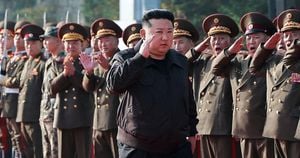The impact of Donald Trump’s election on the Ukraine war has stirred significant debate among political analysts and global leaders. The current geopolitical scenario showcases the intertwining of U.S. elections with international conflicts, emphasizing how domestic political landscapes can have far-reaching global repercussions.
With Trump’s administration during his first term, the relationship between the United States and Ukraine transformed dramatically. Initially, Trump exhibited skepticism about supporting Ukraine against Russian aggression. The former president expressed opinions hinting at prioritizing American interests over traditional alliances and democratic processes, which raised alarms among U.S. allies. This shift played out during the impeachment inquiry over Trump’s pressure on Ukraine to investigate political rival Joe Biden, demonstrating how internal U.S. politics might affect Ukraine's security.
The Biden administration, following Trump's presidency, took on the role of firmly supporting Ukraine through military aid and humanitarian assistance. Yet, with the upcoming 2024 election, there is rising concern about whether this level of support will continue. Analysts observe growing anti-intervention sentiments among certain voter segments, leading to fears about potential instability in U.S.-Ukraine relations if Trump were to regain the presidency.
Trump’s stance on NATO was evident throughout his presidency. He often criticized member countries for not meeting their defense spending commitments, indicating a possible retreat from supporting collective defense agreements. This aspect complements his overall approach to foreign policy, which heavily leans toward America First – focusing on unilateral actions rather than collaborative international efforts. Should Trump clinch the 2024 Republican nomination, his policies may revert to previous defensive stances, affecting resources and military support for Ukraine.
Political experts predict various scenarios depending on the election outcome. If Trump secures victory, the U.S. might witness negotiations with Russia, possibly sidelining Ukraine’s sovereignty issues. Trump's previously stated intentions to engage with Putin to reach some form of accommodation raises eyebrows about the future of NATO’s cohesion and support for Ukraine.
During Trump’s time, U.S. foreign policy became unpredictable, leading to significant changes within Europe. The Ukraine war, which is one of the most pressing crises, has tested the solidarity of the European Union and its members with substantial military and financial support shifted toward Ukraine. Despite Trump’s transactional view of allies, European nations scrambled to bolster Ukraine militarily during the current conflict. They feared the precedent it would set if Russia managed to succeed without facing substantial consequences.
The EU’s predicament resonates closely with this backdrop. A recent resolution adopted by the European Parliament called for continuous military support for Ukraine against Russian aggression. Critics argue this approach fails to acknowledge the shifting political winds, including increasing hesitance among the European populace about prolonged military commitments. Concerns grow over the unsustainable nature of military aid if American support also wavers under a Trump-led government.
This uncertainty leads to another layer of strategic concerns for Ukraine and its allies. The longer the war continues, the more complicated it becomes to balance military objectives achievable through Ukraine's capabilities versus the restrictions imposed by global geopolitical dynamics. Analysts are increasingly warning about the need for negotiation and dialogue to reach sustainable solutions. Yet, the current discourse seems overly fixated on military victories without addressing underlying political dialogues.
Public opinion reflects this rising concern about the war fatigue not only within Europe but also among Americans. With economic challenges prevailing domestically, focusing on military aid abroad becomes contentious. Calls for humanitarian aid instead of outright weapon deliveries resonate with many voters who want to see diplomatic solutions rather than endless warfare. Even within Ukraine, prestigious war-weary voices echo sentiments for negotiations rather than continued conflict.
Should Trump take office again, U.S. diplomatic discourse may pivot toward realigning strategies with Russia, fundamentally altering the balance of power. This concern is magnified against the backdrop of China imposing its influence and the U.S. needing to navigate its foreign policy with far-reaching consequences for European unity.
This potential shift creates apprehension about the future of NATO and its collective response strategies. Recent political analyses imply Trump's undoing of established rules might compel European states to reevaluate their positions, leading to fragments within the alliance. This could eventually move EU countries toward more individualistic policies rather than collective strategies, significantly altering how they engage with Russia.
Through this lens, the consequences of the next U.S. presidential election extend beyond American borders, potentially reshaping global alliances and determining the fate of nations caught within the war’s devastating repercussions. Understanding these dynamics is increasingly important for policymakers aiming to stabilize the region.
Considering the backdrop of Trump's previous presidency and current electoral climate, it remains uncertain how American leadership may navigate these complex global landscapes. Whether the nation retreats to isolationist policies or embraces its traditional role as a world leader could significantly determine the course of the Ukraine war and not just for Ukraine but for the broader geopolitical stability.



